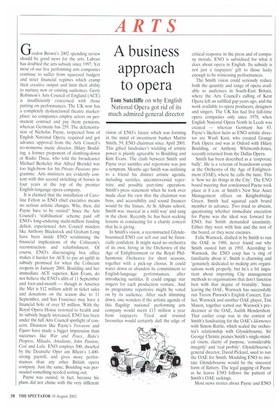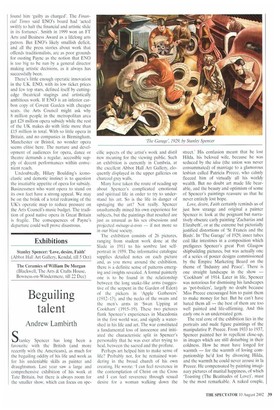A business approach to opera
Tom Sutcliffe on why English National Opera got rid of its much admired general director Gordon Brown's 2002 spending review should be good news for the arts. Labour has doubled the arts subsidy since 1997. Yet most of our live performing arts companies continue to suffer from squeezed budgets and strict financial regimes which cramp their creative output and limit their ability to nurture new or existing audiences. Gerry Robinson's Arts Council of England (ACE) is insufficiently concerned with those putting on performances. The UK now has a completely dysfunctional theatre marketplace: no companies employ actors on permanent contract and pay them pensions, whereas Germany has 259. The defenestration of Nicholas Payne, respected boss of English National Opera, required and got advance approval from the Arts Council's no-nonsense music director, Hilary Boulding, a former proponent of dumbing-down at Radio Three, who told the broadcaster Michael Berkeley that Alfred Brendel was too high-brow for his Private Passions programme. Arts ministers are evidently content with this second switching of horses in four years at the top of the premier English-language opera company.
It is claimed that the installation of Caroline Felton as ENO chief executive means no serious artistic changes. Why, then, did Payne have to be ousted? Since the Arts Council's 'stabilisation' scheme paid off ENO's long-enduring multi-million funding deficit. experienced Arts Council minders like Anthony Blackstock and Graham Long have been inside ENO scrutinising the financial implications of the Coliseum's reconstruction and refurbishment. Of course, ENO's discouraging box office makes it harder for ACE to pay an uplift in subsidy promised for when the Coliseum reopens in January 2004. Boulding and her immediate ACE superior, Kim Evans, do not believe the ENO's alibi of 11 September and foot-and-mouth — though in America the Met is $12 million adrift in ticket sales and donations on the season due to 11 September, and San Francisco may have a financial hole of over $5 million. With the Royal Opera House restored to health and its subsidy hugely increased, ENO has been under the full Arts Council spotlight of concern. Disasters like Payne's Trovatore and Figaro have made a bigger impression than successes like War and Peace, Rake's Progress. Mikado, Ariodante, John Passion, Cosi and Lulu. ENO employs 500, dwarfed by the Deutsche Oper am Rhein's 1,400strong payroll, and gives more performances than any other British opera company. Just the same, Boulding was persuaded something needed sorting out.
Payne was ousted, in fact, because his plans did not chime with the very different vision of ENO's future which was forming in the mind of investment banker Martin Smith, 59, ENO chairman since April 2001. This gifted fundraiser's wielding of artistic power is plainly agreeable to Boulding and Kim Evans. The clash between Smith and Payne over surtitles and repertoire was just a symptom. Months ago Smith was outlining to a friend his distinct artistic agenda, including surtitles, uncontroversial repertoire and possible part-time operation. Smith's press statement when he took over made clear his view that the chairman was boss, and accessibility and sound finances would be the litmus. At St Albans school, Smith was 'musical in a mild way' and sang in the choir. Recently he has been seeking lessons in conducting for a charity concert that he is giving.
In Smith's vision, a reconstructed Glyndebournised ENO can sell out and be financially confident. It might need no orchestra of its own, hiring in the Orchestra of the Age of Enlightenment or the Royal Philharmonic Orchestra for short seasons, together with a pick-up chorus. It could water down or abandon its commitment to English-language performances, after introducing surtitles. It could engage star singers for each production venture. And its programme repertoire might be voted on by its audience. After such slimming down, one wonders if the artistic agenda of this flagship 'national' performing arts company would merit £13 million a year from taxpayers. Tried and trusted favourites would certainly dull the edge of critical response in the press and of company morale. ENO is subsidised for what it does about opera in English. Its subsidy is not just a taxpayers' gift to those lucky enough to be witnessing performances.
The Smith vision could seriously reduce both the quantity and range of opera available to audiences in South-East Britain. where the Arts Council's culling of Kent Opera left an unfilled gap years ago, and the work available to opera producers, designers and singers. The UK has had five full-time opera companies only since 1978. when English National Opera North in Leeds was created — whereas Germany has 83. Payne's likeliest heirs as ENO artistic director are Wasfi Kani, who created Grange Park Opera and was at Oxford with Hilary Boulding, or Anthony Whitworth-Jones, recently returned from the Dallas Opera.
Smith has been described as a 'corporate bully'. He is a veteran of boardroom coups at the Orchestra of the Age of Enlightenment (OAF), where he calls the tune. This is 'how we do things in the City'. The ENO board meeting that condemned Payne took place at 8 a.m. at Smith's New Star Asset Management offices on Knightsbridge Green. Smith had squared each board member in advance. Two tried to abstain, questioning whether immediate execution for Payne was the ideal way forward for ENO, but Smith demanded unanimity. Either they were with him and the rest of the board, or they were enemies.
Felix Warnock, drafted in by Smith to run the OAE in 1988, never found out why Smith ousted him in 1993. According to Warnock, the ENO coup has 'a ring of familiarity about it'. Smith is charming and 'genuinely dedicated to making arts organisations work properly, but he's a bit impatient about importing City management methods to organisations that don't function best with that degree of brutality'. Since leaving the OAE, Warnock has successfully run Trevor Pinnock's English Concert. Earlier, Warnock and another OAE player, Tim Mason, together sorted out Warnock's predecessor at the OAE, Judith Hendershott. That earlier coup was in the context of Smith's fundraising for the OAE's Idomeneo with Simon Rattle, which sealed the orchestra's relationship with Glyndebourne. Sir George Christie praises Smith's single-minded vision, clarity of purpose, 'considerable integrity' and 'real probity'. Glyndebourne's general director, David Pickard, used to run the OAE for Smith. Moulding ENO to imitate Glyndebourne would be the sincerest form of flattery. The legal gagging of Payne as he leaves ENO follows the pattern of Smith's OAE sackings.
Most news stories about Payne and ENO
found him 'guilty as charged'. The Financial Times said ENO's board had 'acted swiftly to halt the financial and artistic slide in its fortunes'. Smith in 1999 won an FT Arts and Business Award as a lifelong arts patron. But ENO's likely smallish deficit, and all the press stories about work that offends traditionalists, are as poor grounds for ousting Payne as the notion that ENO is too big to be run by a general director making artistic decisions, as it always has successfully been.
There's little enough operatic innovation in the UK. ENO, with its low ticket prices and few top stars, defined itself by cuttingedge theatrical stagings and artistically ambitious work. If ENO is an inferior carbon copy of Covent Garden with cheaper seats, the Arts Council might ask why 8 million people in the metropolitan area get £28 million opera subsidy while the rest of the UK makes do with little more than £15 million in total, With so little opera in Britain, and no companies in Birmingham, Manchester or Bristol, no wonder opera seems elitist here. The nurture and development of audiences for opera, dance or theatre demands a regular, accessible supply of decent performances within convenient reach.
Undoubtedly. Hilary Boulding's iconoclastic and demotic instinct is to question the insatiable appetite of opera for subsidy. Businessmen who want opera to stand on its own feet have a strong appeal. We may be on the brink of a total redrawing of the UK's operatic map to reduce pressure on the Arts Council's music budget. The tradition of good native opera in Great Britain is fragile. The consequences of Payne's departure could well prove disastrous.



























































 Previous page
Previous page